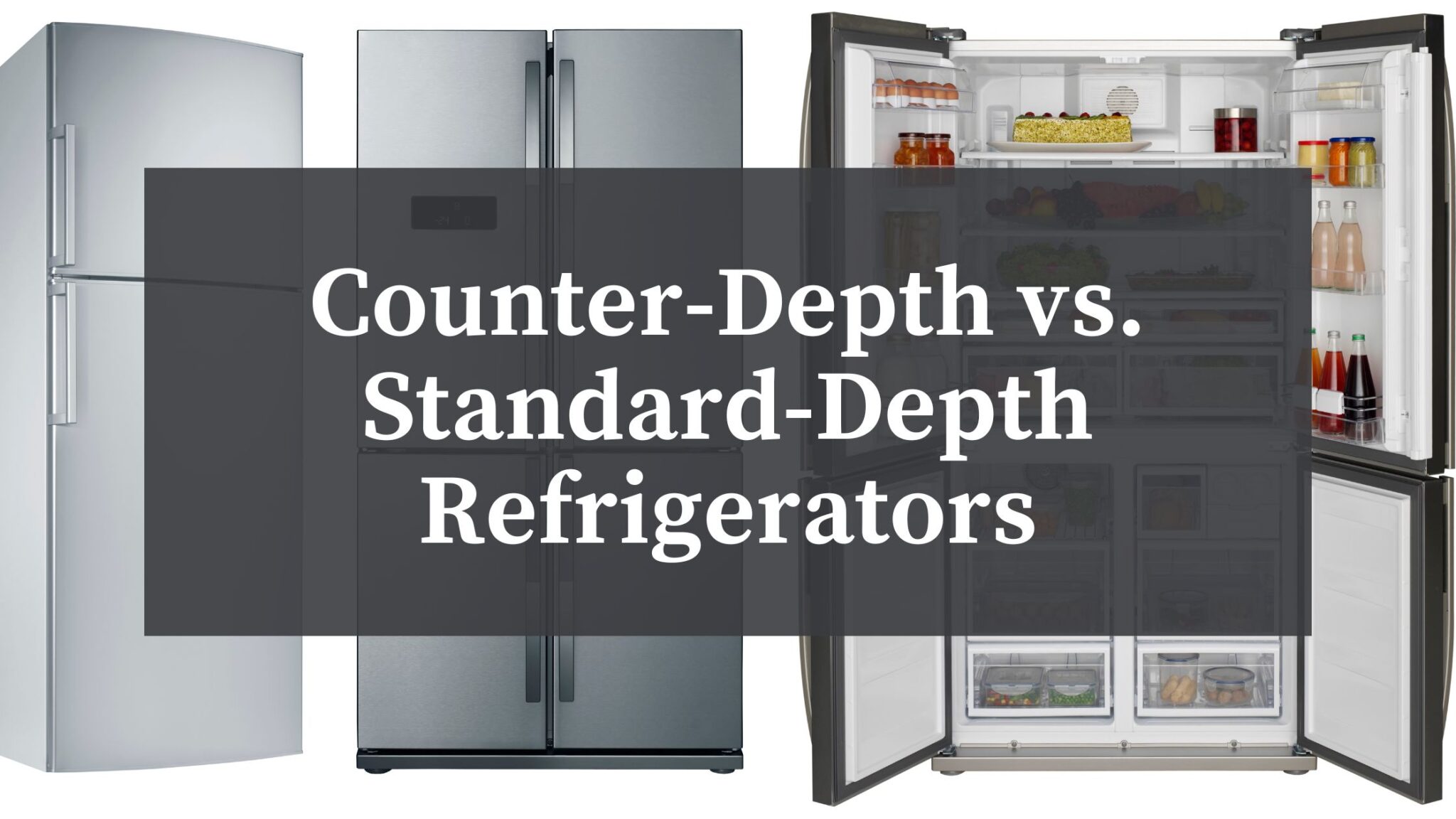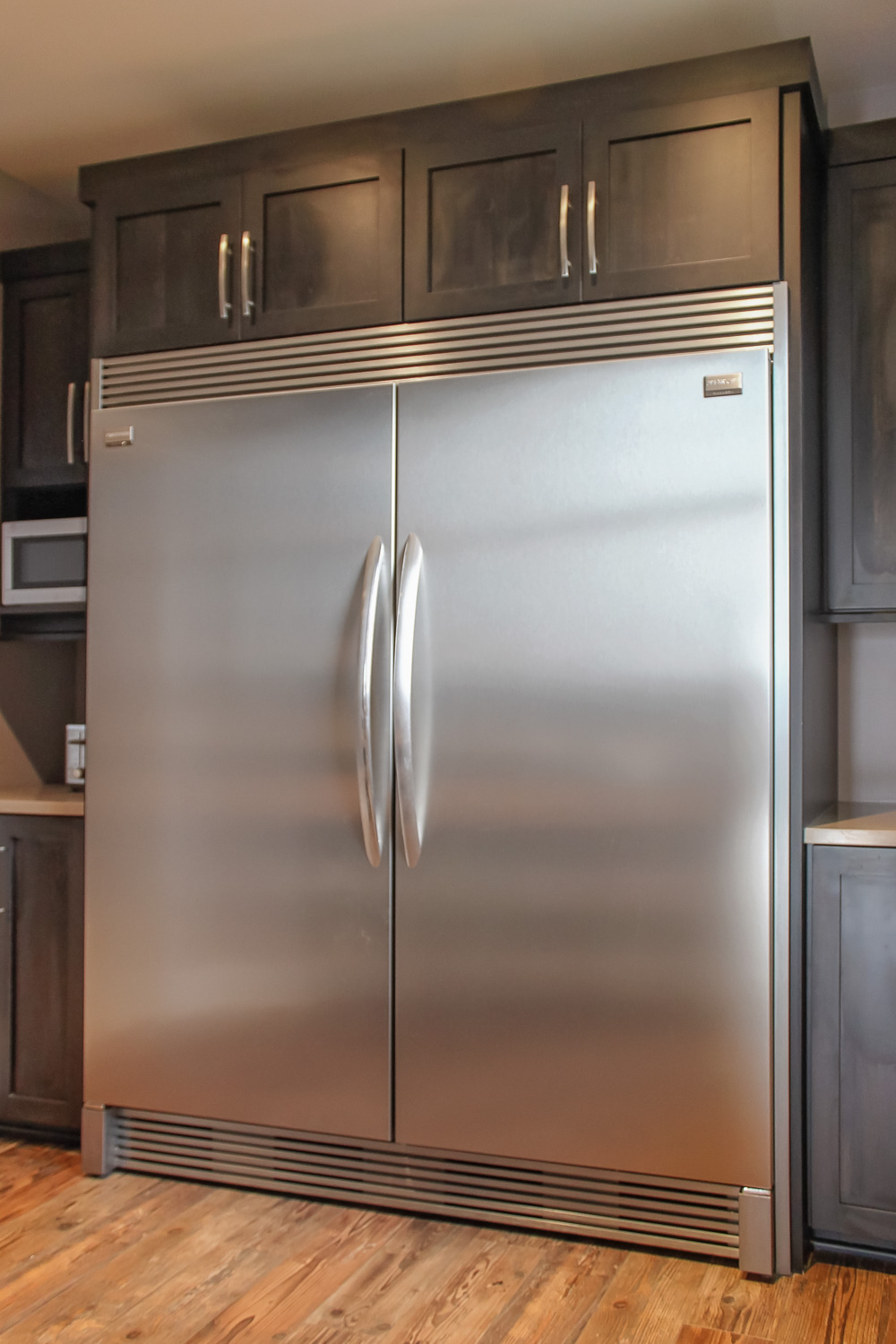Get ready for the culinary battle of the century: counter-depth vs. standard-depth refrigerators! It’s a clash of titans in the realm of kitchen appliances, where each contender brings its unique advantages and drawbacks to the table. Hold on tight as we delve into this riveting battle to determine the refrigerator that’s right for you.
Are you constantly struggling with bulky appliances jutting out into your kitchen space? Do you feel like your refrigerator is crowding out your other kitchen essentials? You’re not alone! Many homeowners face these frustrations, searching for a solution that harmonizes with their kitchen’s design and maximizes space utilization. Enter the counter-depth refrigerator, a revolutionary option designed to blend seamlessly with your cabinetry, creating a clean and streamlined aesthetic. But don’t count out standard-depth refrigerators just yet. These traditional workhorses offer their own set of advantages, so let’s explore both options in depth to help you make an informed decision.
The counter-depth refrigerator, as its name suggests, is designed to sit flush with your kitchen counter, creating a cohesive and aesthetically pleasing look. No more protruding handles or bulky sides breaking up the sleek lines of your kitchen design. Its shallower depth allows for more flexibility in kitchen planning, making it ideal for smaller spaces or kitchens with limited layout options. However, this reduced depth comes with a compromise: counter-depth refrigerators typically offer less interior space compared to their standard-depth counterparts.
Standard-depth refrigerators, on the other hand, reign supreme when it comes to capacity. With their deeper interiors, they provide ample storage space for all your culinary adventures. Whether you’re a family of five or an avid meal prepper, a standard-depth refrigerator will ensure you never run out of room for fresh produce, leftovers, and all your favorite treats. However, their greater depth can be a drawback in compact kitchens, where every inch of space is precious.

Battle of the Depths: Counter-Depth vs. Standard-Depth Refrigerators
Personal Experience:
In my own kitchen, I initially opted for a standard-depth refrigerator, lured by its spacious interior. However, as my kitchen gradually evolved and I embraced a more modern design aesthetic, the protruding sides of my refrigerator felt increasingly out of place. It became clear that a counter-depth refrigerator was the perfect solution to achieve the sleek and seamless look I desired. While I had to sacrifice some interior space, the aesthetic benefits more than made up for it. My kitchen now feels more cohesive and inviting, and I’m no longer wrestling with bulky appliances that infringe on my cooking space.
Unveiling the Depths: Counter-Depth Refrigerators
Counter-depth refrigerators are the epitome of space optimization, designed to blend seamlessly with your kitchen cabinetry. Their shallower depth makes them ideal for compact kitchens or spaces with limited layout options. Counter-depth refrigerators typically offer a depth of 24 inches, allowing them to sit flush with your countertops, creating a streamlined and uncluttered aesthetic. While they may have a slightly reduced interior capacity compared to standard-depth models, counter-depth refrigerators make up for it with their space-saving prowess and ability to enhance the overall design of your kitchen.

Standard-Depth Refrigerators: The Pillars of Capacity
Standard-depth refrigerators are the traditional workhorses of the kitchen, offering ample storage space to accommodate all your culinary needs. With a depth ranging from 27 to 30 inches, standard-depth refrigerators provide generous interior capacity, making them the ideal choice for families, avid meal preppers, or those who simply prefer having extra space for their groceries. Standard-depth refrigerators may extend slightly beyond your countertops, but their spacious interiors more than compensate for their larger footprint. If you prioritize storage capacity above all else, a standard-depth refrigerator is the way to go.
Exploring the History and Myth of Refrigerators
The journey of refrigeration has been an intriguing one, marked by innovation and technological advancements. From the earliest iceboxes to the modern marvels we have today, refrigerators have played a pivotal role in shaping our dietary habits and preserving the quality of our food. Over the years, refrigerators have evolved to meet the changing needs of consumers, leading to the emergence of counter-depth and standard-depth models. Counter-depth refrigerators, with their space-saving design, have gained popularity in recent years, while standard-depth refrigerators remain the preferred choice for those seeking maximum interior capacity.
Unveiling the Hidden Secrets of Refrigerators
p>Beyond their practical functionality, refrigerators hold hidden secrets that contribute to their efficiency and performance. One such secret is the use of insulation materials. Insulation plays a crucial role in maintaining the desired temperature within the refrigerator, preventing heat from entering and cold air from escaping. Different types of insulation materials are used, each with its unique properties and impact on energy consumption. Understanding the insulation capabilities of a refrigerator can help you make an informed choice that aligns with your energy-saving preferences.
Navigating the Recommendations for Refrigerators
Choosing the right refrigerator can be a daunting task, but with careful consideration, you can find one that meets your specific needs. When evaluating refrigerators, consider factors such as capacity, energy efficiency, features, and style. Determine the optimal capacity based on your household size and storage requirements. Energy efficiency is another important aspect to consider, as it can impact your monthly energy bills and contribute to a greener lifestyle. Features such as adjustable shelves, spill-proof drawers, and water dispensers can enhance convenience and functionality. Lastly, choose a style that complements your kitchen décor, whether it’s a sleek stainless steel finish or a classic white exterior.

Refrigerators and Sustainability
In today’s eco-conscious era, sustainability has become an increasingly important factor to consider when purchasing appliances. Refrigerators, being energy-intensive appliances, play a significant role in our energy consumption. Look for refrigerators with energy-saving features such as ENERGY STAR certification, which indicates that the appliance meets strict energy efficiency standards set by the U.S. Environmental Protection Agency (EPA). By choosing an energy-efficient refrigerator, you can reduce your energy consumption, lower your utility bills, and contribute to a more sustainable lifestyle.
Tips for Maintaining Refrigerators
To ensure optimal performance and longevity of your refrigerator, regular maintenance is essential. Here are some tips to keep your refrigerator in tip-top shape: Regularly clean the condenser coils located at the back or bottom of the refrigerator, as dust and dirt accumulation can impede heat transfer and increase energy consumption. Replace the water filter every six months to maintain clean and fresh water from the dispenser and ice maker. Avoid overloading the refrigerator, as it can block airflow and affect cooling efficiency. Keep the temperature settings at the recommended levels to prevent spoilage and maintain food quality.

Refrigerators and Food Preservation
Refrigerators play a vital role in preserving the quality and safety of our food. Maintaining proper temperature settings is crucial to slow down the growth of bacteria and extend the shelf life of perishable items. Different types of food have specific optimal storage temperatures, so it’s important to familiarize yourself with the recommended temperatures for various food categories. By understanding the science behind food preservation, you can maximize the effectiveness of your refrigerator and minimize food spoilage.
Fun Facts About Refrigerators
Did you know that the first electric refrigerator for home use was invented in 1913? Since then, refrigerators have undergone remarkable advancements, becoming an indispensable part of our modern lives. Here’s a fun fact: The average American household has at least one refrigerator, and some households may even have multiple refrigerators for different purposes. Refrigerators have also made their way into pop culture, appearing in movies, TV shows, and even songs. From the iconic “Happy Days” refrigerator to the futuristic refrigerators in science fiction films, these appliances have captured our imagination and become a symbol of convenience and modernity.

Troubleshooting Refrigerators
While refrigerators are generally reliable appliances, occasional issues may arise. If you encounter any problems with your refrigerator, start by checking the power source and ensuring that the appliance is properly plugged in. If the power is connected but the refrigerator is not cooling, it could be due to a faulty thermostat or a problem with the compressor. Unusual noises coming from the refrigerator may indicate issues with the fan or the compressor. In such cases, it’s recommended to contact a qualified appliance repair technician for professional assistance. By addressing any issues promptly, you can ensure that your refrigerator continues to operate efficiently.
What Ifs About Refrigerators
Have you ever wondered what would happen if your refrigerator suddenly stopped working? While it’s not a pleasant thought, being prepared for such a scenario can help you minimize food spoilage and prevent unnecessary losses. If your refrigerator malfunctions, the first step is to check the power source and ensure that the appliance is properly plugged in. If the power is connected but the refrigerator is not cooling, you can try resetting the appliance by unplugging it and plugging it back in after a few minutes. However, if the refrigerator continues to malfunction, it’s important to contact a qualified appliance repair technician promptly.

Listicle: Refrigerators Through the Ages
The evolution of refrigerators has been a fascinating journey, marked by technological advancements and changing consumer needs. Here’
